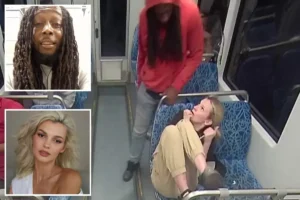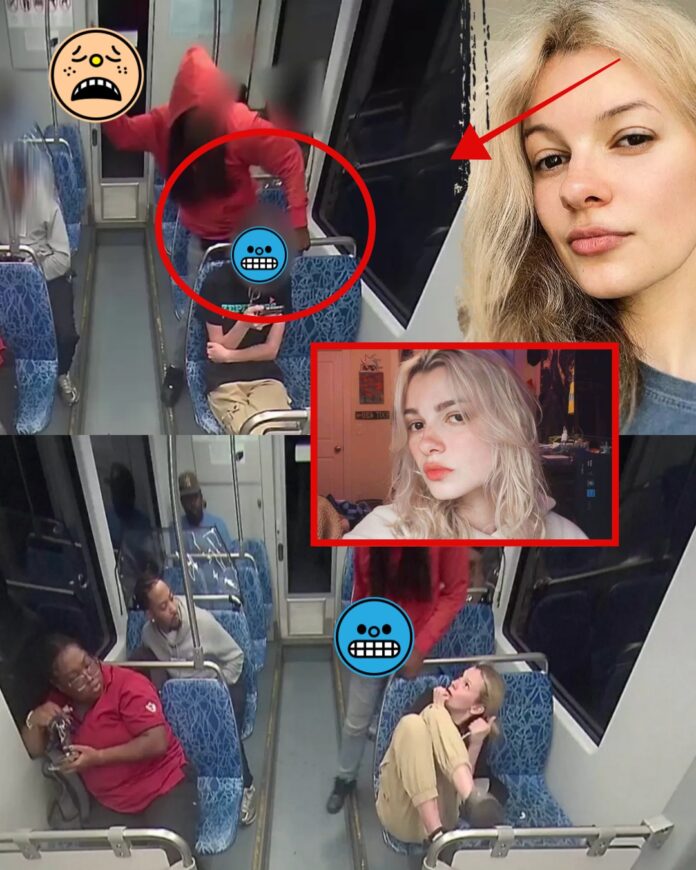DETAILS EMERGE: Iryna Zarutska’s Final Phone Call Adds New Layer of Mystery to Tragic Death
In a gripping new development in the tragic case of Iryna Zarutska, the 23-year-old Ukrainian refugee fatally stabbed on a Charlotte light rail train on August 22, 2025, newly released details from station surveillance footage have deepened the enigma surrounding her final moments. Cameras at the Scaleybark station captured Zarutska on a phone call lasting exactly 37 seconds before she boarded the Lynx Blue Line, where she would be attacked minutes later. While the identity of the person on the other end of the call remains undisclosed, enhanced audio analysis of the footage revealed her final two words: “Don’t come.” This cryptic utterance, combined with the previously reported three-page handwritten letter with its blacked-out final page and a haunting voicemail containing an unidentified background voice, has intensified public fascination and raised urgent questions about what—or who—Zarutska may have been warning in her last moments.

A Fleeting Life, a Lasting Impact
Iryna Zarutska’s journey to Charlotte, North Carolina, was one of hope born from hardship. Fleeing Ukraine in August 2022 with her mother, Anna, sister, Valeriia, and 14-year-old brother, Bohdan, she escaped the devastation of Russia’s invasion. A graduate of Synergy College in Kyiv with a degree in art and restoration, Zarutska was known for her creative spirit, crafting personalized artwork and dreaming of a career as a veterinary assistant. Enrolled at Rowan-Cabarrus Community College and working at Zepeddie’s Pizzeria, she embraced her new life with a quiet resilience, her radiant smile and love for animals endearing her to neighbors and coworkers alike. Her mother described her as a “homebody” whose “artist’s gift” shone in her eclectic fashion and thoughtful gestures.
On the evening of August 22, Zarutska finished her shift at the pizzeria and arrived at Scaleybark station around 9:50 p.m. Surveillance footage, released by the Charlotte Area Transit System (CATS) and analyzed by investigators, shows her standing on the platform, engrossed in a 37-second phone call. Dressed in khaki pants, a dark shirt, and her work hat, with her long blonde hair tucked away, she appeared calm but focused. The call ended just before she boarded the Blue Line train at 9:52 p.m. Four minutes later, Decarlos Brown Jr., a 34-year-old man with a history of mental illness and prior convictions, stabbed her three times, at least once in the neck, in an unprovoked attack. Zarutska collapsed, clutching her wounds, and died at the scene despite passengers’ attempts to intervene. Brown was arrested on the platform and charged with first-degree murder and a federal count of causing death on a mass transit system.
The Mysterious Phone Call

The 37-second phone call has become a focal point of the investigation. Enhanced audio from the station’s cameras, equipped with advanced subtitle technology, captured Zarutska’s voice clearly in the final moments of the call. Her last words, “Don’t come,” delivered in a hushed but firm tone, have sparked intense speculation. Was she warning someone to avoid the station, perhaps sensing danger? Or was the statement unrelated to the impending attack, tied instead to a personal matter? The identity of the person on the other end remains undisclosed, with Charlotte-Mecklenburg police citing the ongoing investigation. Sources close to the case suggest investigators are reviewing Zarutska’s phone records to trace the call, but no official statement has confirmed whether the recipient has been identified.
The revelation of the phone call dovetails with other enigmatic clues in the case. A three-page handwritten letter, dated the same day and found by her family, included a final page entirely obscured by black ink, hinting at a hidden message. Additionally, a voicemail sent to her best friend, Olena, five minutes after her last text, captured Zarutska’s voice saying, “Come home soon ❤️,” followed by three seconds of a faint, unidentified background voice—possibly Brown’s, given his reported mutterings about “mind control.” Together, these elements paint a picture of a young woman whose final hours were marked by cryptic communications, each raising more questions than answers.
A Suspect’s Troubled Past
Decarlos Brown Jr.’s history has fueled public outrage and highlighted systemic failures. Diagnosed with schizophrenia, Brown had a criminal record spanning 14 arrests in Mecklenburg County since 2011, including convictions for armed robbery, felony larceny, and breaking and entering. His family, particularly his mother, Michelle Dewitt, and sister, Tracey Brown, described his struggles with untreated mental illness, including paranoid delusions and aggressive outbursts. In 2022, Brown attacked Tracey, though she dropped charges out of concern for him. In January 2025, he was arrested for harassing 911 operators with claims of government surveillance but was released shortly after. Despite Dewitt’s attempts to secure long-term care, legal barriers prevented intervention, as she lacked guardianship. Brown’s chilling post-arrest claim—that he attacked Zarutska because he believed she was “reading his mind”—underscores the depth of his mental health crisis.
A Polarized Response
Zarutska’s death has ignited fierce debate in the United States and beyond. President Donald Trump and conservative commentators have seized on the incident to criticize Democratic-led cities, with Trump labeling Brown a “career criminal” on Truth Social and tying the attack to broader calls for federal intervention in urban crime. U.S. Attorney General Pam Bondi vowed to pursue the maximum penalty, ensuring Brown faces life without parole or the death penalty. Charlotte Mayor Vi Lyles, meanwhile, described the incident as a “systemic failure,” prompting CATS to bolster security with increased fare inspections and patrols. Critics argue that politicizing the tragedy oversimplifies complex issues like mental health care and public transit safety.

In Ukraine, Zarutska’s death has struck a profound chord, symbolizing the fragility of refuge. Ukrainian communities in the U.S. and abroad have expressed grief and frustration, with some, like 22-year-old Lyubov in North Carolina, linking the incident to rising violence. Others have criticized the lack of response from Ukrainian officials, who may be navigating U.S. political dynamics. Social media platforms like X buzz with tributes and theories, with users speculating about the phone call’s recipient and the meaning of “Don’t come.” A GoFundMe campaign for Zarutska’s family has raised over $130,000, reflecting global support.
A Community in Mourning
The Scaleybark station has become a site of pilgrimage, adorned with flowers, candles, and notes reading “We failed you.” Zarutska’s family, grappling with unimaginable loss, shared the phone call details to humanize her amid the media storm. Her brother, Bohdan, who has replayed her final voicemail 27 times, finds solace in her voice but is haunted by the unanswered questions. Her uncle, speaking on Good Morning America, called the surveillance footage “heart-wrenching,” while friends shared a tribute video on Instagram, capturing Zarutska’s joy in swimming, playing cards, and dancing.
The 37-second call, with its cryptic final words, adds a poignant layer to an already complex tragedy. Was Zarutska warning a loved one to stay away from danger, or was her statement a fleeting remark in a personal conversation? As investigators work to identify the call’s recipient and analyze the audio, the public remains captivated by the possibility that her words hold the key to understanding her final moments. Forensic experts may yet uncover connections between the call, the blacked-out letter, and the mysterious voicemail, but for now, “Don’t come” echoes as a haunting plea from a young woman whose life was stolen too soon.
Zarutska’s story—a refugee’s hope, a family’s loss, and a community’s reckoning—continues to resonate. Her final words, captured in fleeting moments, demand justice and reflection, urging society to address the failures that allowed this tragedy to unfold. Whether the phone call’s mystery is solved, Iryna Zarutska’s memory endures, a call to protect the vulnerable and honor the lives cut short.
